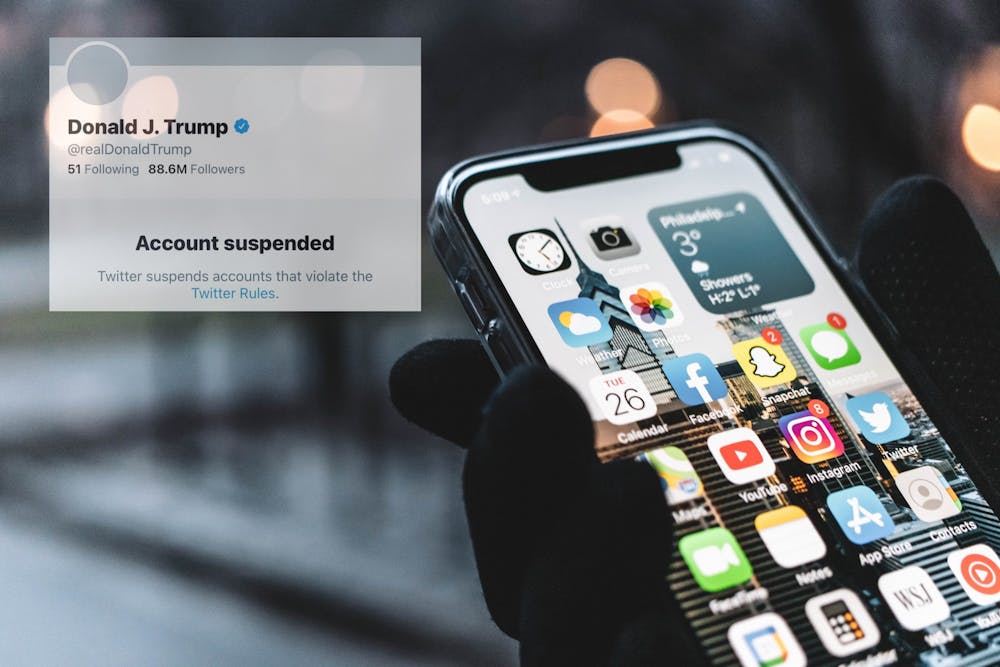Over the course of the last few months, my regular social media scroll has been swarming with political speech. Part of that is Facebook’s algorithms, which has clearly gotten a handle on the fact that I like politics. However, much of my feed is reposts and commentary from every person I follow. In an age where so much information is accessible, everyone has thoughts and social media has given them a platform to share them.
Lately, I haven’t been able to escape the elated responses to Trump’s ban from Twitter and Parler’s subsequent erasure from the internet, with social media companies calling the capitol riots on January 6th “the final straw” to justify their removal. Moreover, I don’t know many people who will miss Trump’s not-always-substantive tweets. However, this poses a new question: what precedent does this set for the censorship of political speech and the power of big tech at large?
I was struck by the irony of my Penn peers’ reactions to Trump’s ban. Their dislike of the former president wasn’t new, but as people who overwhelmingly used social media for political advocacy, I was surprised they weren’t the least bit concerned about the implications this could have for the culture of political conversation online.
Particularly in the case of Penn, which would usually be buzzing with dialogue, the school was quiet during arguably one of the most divisive presidential elections in our lifetime. The “Civic Ivy” was forced to move online. Prominent organizations such as Penn Leads the Vote ran their registration campaign largely virtually and various social justice groups such as Fossil Free Penn, Police Free Penn, and Penn Justice Democrats conducted their campaigns almost exclusively on social media.
The same people I saw clapping in response to the locking of President Trump’s Twitter account are also the people who regularly condemn the culture of big business in America and the influence of the wealthy. This pandemic has proved to us that it is very possible that online communication is crucial to the circulation of political information. If that is the case, why don’t people feel concerned that the next step could be to lock their accounts for tweeting about something with which billionaire Jack Dorsey disagrees?
Well, before you point me to the (very) fine print of social media platforms’ “terms and agreements” or say that you won’t be censored because you won’t “incite violence,” I’d like to highlight the hypocrisy in such censorship campaigns.
Across the world, politicians and government organizations linked to human rights violations have found a platform on Twitter, including various top government officials in China such as Zhao Lijian and Hua Chunying, the Russian Kremlin, Ayatollah Khomeini, former Supreme Leader of Iran, and Nicolás Maduro, president of Venezuela.
Despite Twitter’s rapid shutdown of the ultimately true story regarding the Department of Justice investigation into Hunter Biden, which was broken by the New York Post in October, it wasn’t until a few days ago that the Chinese embassy in Washington was held accountable for statements of support made to Beijing's treatment of Uighur Muslims in work camps.
This is simply another story in a long line of selective censorship by these companies when it is convenient for their political affiliations. As early as 2018, Prager University, a conservative media outlet, sued Google, Facebook, and YouTube for blocking their videos, leading to a subsequent apology.
So, if you disagree with the content posted by these platforms, how does this impact you? For starters, despite what may be an agreeable political opinion now, allowing platforms like Twitter and Facebook to exercise this much power sets a dangerous precedent for what could next be the oppression of your beliefs.
But more importantly, we must all agree that social media has become a public forum, meaning a space designated for “free exercise of the right to speech and public debate and assembly” as the legal definition suggests. In addition, precedent in the U.S. suggests that places where political speech occurs must be inherently public. This is affirmed by policies like Section 230 of the Communications Decency Act, which protects social media outlets from liability for the content posted by their users.
With no other alternatives to large companies like Twitter, Facebook that have monopolized the online market, it’s become crucial that these platforms allow for the free exercise of speech. In an election where we saw more “virtual yard signs” and Instagram story platform descriptions than in-person canvassing, we can see the role that these companies played in the circulation of political information, discourse and debate.
In the same way, the Penn student body has held our administration accountable through online petitions and organization virtually throughout the pandemic. Without free speech on social media and internet platforms activism of all kinds, both political and otherwise is under siege.
LEXI BOCCUZZI is a College first year studying Philosophy, Politics, and Economics from Stamford, Ct. Her email is abb628@sas.upenn.edu.









